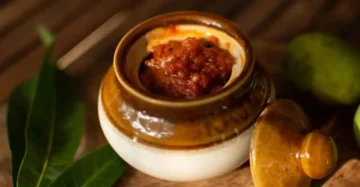Blog
BEST PRACTICES FOR STORING INDIAN PICKLES

People derive immense satisfaction from preparing their own pickles. It allows them to preserve fresh produce and relish it all year round. However, the question remains, what is the longevity of pickles?
Understanding the shelf life of pickles can be challenging, but having some knowledge about the preservation process can aid in determining their durability.
Typically, pickles contain vinegar, sugar, and salt, turmeric, all of which possess preservation properties. The quantity of these ingredients in a pickle determines its shelf life. Even Mustard seeds/powder help in keeping the vegetables/fruits/meats in the pickle crispier and fresh.
Acidity is a fundamental aspect of all pickles as it aids in the preservation process. Other preservation methods, such as hot water bath canning, can also be employed to extend the pickle’s longevity.
Initially, acidity is utilized to prevent spoilage of the pickle. After packing the pickle into jars, they are submerged in boiling water for a duration of approximately 10 to 20 minutes.
In the packaging process of pickles, hot water bath canning is a technique that significantly prolongs the pickle’s shelf life. One needs to take utmost care that there is no moisture left in the jars, they have to be 100% free of any moisture.
The boiling water bath method effectively processes the jars and their contents, eliminating any bacteria that could spoil the pickle. Moreover, the enzymes present in the fruit or vegetable, which could cause the pickle to spoil, are also inhibited through this process.
Although keeping pickles submerged in oil or vinegar can help maintain their freshness. Sealed jars are typically free of bacteria until they are opened, exposing their contents to spoilage microorganisms. This is why most store-bought food items include a recommendation to consume them within a specified time frame after opening.
Once a pickle jar is opened, it’s imperative to refrigerate the contents and consume them within a relatively brief period.
Refrigeration is a common method of prolonging the shelf life of various food items. However, certain types of pickles are refrigerated to ensure their consumption within a short period.
Simple steps to follow to preserve your pickles.
It is recommended to store pickles in glass bottles or earthenware jars, also known as Jaddi in India. Ensure that you have enough jars to store the quantity of pickles you have prepared.
To ensure better results, it is advisable to use wide-mouthed bottles or jars for storing pickles. The container should be filled to the brim with the pickle and topped with a clear layer of oil. Filling the jar to the brim also aids in removing the maximum amount of air from the bottle, which can be a contaminating factor. If using a jar with a metal lid, ensure that the lid has a plastic coating on its inner surface. Alternatively, a jar with a plastic lid with threads is preferred. Prevent metal lids from coming into contact with pickles as the metal can corrode, negatively impacting the flavor and ultimately spoiling the pickle. This is a critical step in the process.
Before using the jars for pickling, it is important to clean and sterilize them. To achieve this, wash the bottles thoroughly and place them in cold water. Heat the bottles along with the water until the water comes to a boil. Allow the bottles to boil for approximately 5-6 minutes, then remove them from the water and place them upside down on kitchen tissues for a few minutes, ensuring they are completely dry. Another option is to use an oven by laying the bottles on their sides and heating them at 110 degrees Celsius for 12 to 15 minutes to achieve optimal sterilization. Allow the bottles to cool down to room temperature before you start transferring your pickle.
Avoid using a cloth or tissue to clean the inner surface of the bottles once they are sterilized. It is recommended to sterilize the bottles on the same day they will be used for transferring the pickles.
Use a clean stainless steel spoon or ladle that is free of moisture and foreign matter when handling pickles. It is a good practice to label your pickles properly and include the date of preparation.
Store all pickles in a cool dry place, take care that the jars do not get exposed to direct sunlight, and keep your jars away from children.
In simple words, clean, cool, and dark storage is recommended for sealed jars after washing, sterilizing, drying, labelling, and storing.
